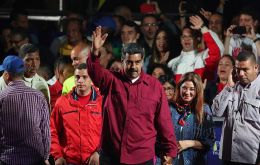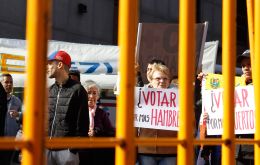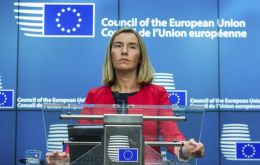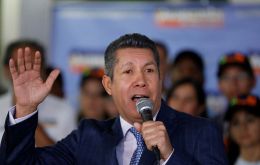MercoPress. South Atlantic News Agency
Tag: Henri Falcon
-
Monday, May 21st 2018 - 08:33 UTC
Maduro re-elected, but with massive abstention and other candidates call for fresh elections

Venezuela’s populist leader Nicolas Maduro won a new six-year term on Sunday, but his main rivals disavowed the election alleging massive irregularities in a process critics decried as a farce propping up a dictatorship. Victory for the 55-year-old former bus driver, who replaced Hugo Chavez after his death from cancer in 2013, may trigger a new round of western sanctions against the populist government as it grapples with a ruinous economic crisis.
-
Sunday, May 20th 2018 - 19:55 UTC
Venezuelans in Uruguay demonstrated by denouncing “fraudulent” presidential elections

Little by little, around noon on this Sunday, Venezuelans living in Uruguay gathered in front of the Venezuelan embassy in Montevideo to protest against what they consider “unfair and fraudulent” presidential elections. The diplomatic office, where an electoral table was installed where 405 Venezuelans living in Uruguay would be authorized to vote by the electoral register, was fenced with by the police for fear of violent attacks.
-
Friday, May 18th 2018 - 09:06 UTC
Maduro wraps up electoral campaign next to Erdogan and Maradona

Venezuela's diplomatically isolated president got a show of support from his Turkish counterpart Tayyip Erdogan and Argentine soccer legend Diego Maradona on Thursday ahead of a weekend election widely decried as unfair. The United States, the European Union and major Latin American countries have criticized Sunday's vote in which populist President Nicolas Maduro is likely to win re-election to a six-year term.
-
Friday, May 4th 2018 - 08:49 UTC
EU parliament demands Venezuela elections be 'immediate suspended'

The European Parliament voted on Thursday for the immediate suspension of the presidential elections on May 20 in Venezuela, considering that they do not guarantee any credibility for their lack of transparency and inclusion. In this way, the body and the representative of the European Union (EU) for Foreign Policy, Federica Mogherini, call for the restructuring of an electoral agenda in which there are no outlawed candidates and the necessary electoral guarantees are fulfilled.
-
Saturday, March 3rd 2018 - 10:35 UTC
Venezuela postpones presidential election a month; ex Chavista challenges Maduro

Venezuela's national election board announced the vote slated for April 22 had been pushed back to the second half of May, with a final date to be specified later, after a pact between Maduro’s government and some opposition parties.
